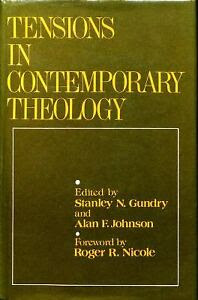Note: I find it ironic and a little sad that just a few years after this Alvin Plantinga would philosophically trounce the verification principle and reassert traditional theism as a viable intellectual option. Van Buren simply lapped up the current philosophical currents rather than critically engaging them from a Christian worldview. The verification principle is now seen to be bankrupt and Van Buren's theology is a relic of the past and has so contemporary staying power.
8. "Finally, attempts to erect systems of theology upon the supposed ruins of a revelation which is rejected run counter to what has been deeply felt by the Christian community. More important still, such systems have an opponent which they refuse to see or to acknowledge--namely, the dynamic which is inherent in the inspired Word, the dynamic of the Holy Spirit, who was the agent of its inspiration." Kuhn, 170
Note: This is one of my favorite quotations from this book. It reminds us that theological polemics is not simply a wrangle of words. The battle between belief and unbelief is one in which the Holy Spirit takes sides. He is committed to exalting and glorifying Christ Jesus and his gospel (John 16.13-15). He will not suffer the name of Jesus to be forever demeaned and dragged through the muddy waters of alien theological presuppositions.
9. "Being a conservative evangelical and accepting the doctrine of biblical infallibility does not require any sacrificium intellectus (the sacrifice of one's understanding or intellectual integrity). Quite the contrary is true. It is, rather, other varieties of theology, ones that have enjoyed greater vogue in academic circles, that require such a sacrifice. Intellectually speaking, we should defend the viewpoint that evangelical theology is not merely a viable option but a superior one." Brown, 328
10. "'Dialogue' only a partial possibility. Prior to regeneration the human mind is inherently incapable of grasping, even merely intellectually, the substance of the biblical message. Consequently, the dialogue of the believing Christian thinker with unbelieving intellectual colleagues will always operate under severe handicaps. It is, of course, possible to present the Gospel in such a manner that the difficulty of believing it is magnified unnecessarily. But it is never possible to present it in such a manner that every difficulty associated faith is removed, particularly in the light of the fact that at least one major impediment to belief lies neither in the message itself nor in its presentation but in the heart of the unconverted hearer.... Even when all possible intellectual roadblocks have been cleared, some barriers will remain, apart from the grace of God and the transforming work of the Holy Spirit in the unconverted heart. The unbeliever is not prepared to see his difficulty in accepting the content of the Gospel message in these terms but will believe that certain intellectual or moral obstacles remain to be surmounted. Thus the unbeliever may well encourage his Christian colleagues in the misapprehension that by a more skillful and subtle approach to the problem, by a more delicate and discriminating sensitivity, by a more thorough command of the attendant facts and related intellectual disciplines, they could carry the dialogue through to successful persuasion. We must recognize that this is an illusion: when all major and minor intellectual obstacles have been removed, all questions fairly met, and no issues skirted, the Gospel will continue to be rejected 'intellectually' as long as it is not accepted spiritually, that is, as long as repentance and conversion are not present." Brown, 329-330
11. "The danger of intellectual respectability. The evangelical who is concerned to show the intellectual respectability of scriptural teachings set himself a worthy goal; but unless he remembers that he can never fully secure the approval of unbelievers for his doctrine apart from their spiritual conversion, there may come a time when he is tempted to compromise the Bible's proclamation in order to secure greater agreement from the participants in the dialogue. The greatest scholarly accuracy and the highest intellectual attainments on the part of the evangelist or apologete will not entirely free him from intellectual disrepute as long as he submits, in the final analysis, to the authority of the Bible as the Word of God and affirms the need for personal conversion and salvation by grace through faith. In each of these doctrines there is something that offends the natural man. That offense cannot be removed, no matter how tactful or erudite the presentation, as long as the message is not altered." Brown, 330
12. "A defective theology may not destroy an individual's saving faith nor his personal relationship to Christ; but it will make it difficult or impossible for him to transmit or teach the truths of the faith to those who come after him." Brown, 331
13. "It should now be evident that the least sophisticated fundamentalist, with a naive and perhaps even myopic acceptance of partially understood Scripture, is less likely to make errors disastrous for his faith and salvation than the refined critic who wonders whether God can speak, whether He would use human language to do so, and whether human language is capable of expressing anything unambiguous in which we can unreservedly put our trust." Brown, 350-351
14. "The human rebellion against the will of God has in a way proceeded serially against the persons of the Trinity: rebellion against the Holy Spirit in the rejection of inspiration in the eighteenth and nineteenth centuries; rebellion against the Son in the rejection of a substitutionary atonement and redemption through the blood of Christ in the nineteenth and twentieth; now, rebellion against the Father in the denial of creation and even of the objective reality of the universe in the twentieth." Brown, 353-354
